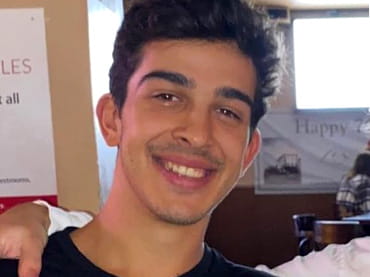The Challenge: Back-to-Back-to-Back Concussions
Ottawa native Zack had just begun his first semester of college in 2016 when he sustained his first serious concussion. Studying economics and political science at Dalhousie University in Halifax, he went out for homecoming night but woke up the next morning with a splitting headache, disorientation, and confusion – knowing he must have hit his head.
“I had concussions before from rugby and hockey in high school, but I always felt better in a few days. This was different,” says Zack.
The symptoms lingered for weeks, prompting Zack to go home for a bit where he began to feel better. He returned to school feeling “slightly off” and fell backwards off a chair – hitting his head again in January 2017. The returning symptoms led Zack to take a semester off from school.
He again started to feel better, even playing some pickup basketball with friends the following month, but that’s when he was accidentally elbowed in the back of the head.
“I was immediately nauseous,” says Zack. “The headaches, disorientation, and eyestrain came back too and continued for several months.”
Zack’s Path to UPMC for Concussion Treatment
Diagnosed with a concussion by his primary doctor close to home and instructed to stay away from the overstimulating activities that triggered him, Zack simply wasn’t getting better.
“I had this never-ending barrage of symptoms and just felt like I was in limbo,” Zack says.
He tried all types of treatments from chiropractic care, to massage therapy, to ophthalmology – and even some options that he considered to be “not guaranteed or alternative”. Each specialist focused only on their area of expertise, while Zack waited for results that did not come.
In late summer of 2017, he continued his online research and hoped to return to school in September. That’s when he discovered the UPMC Sports Medicine Concussion Program and read about treatments that meet a concussion head-on.
“The testimonials were a major factor for me when I was looking into the program, just to see others in the same situation recovering,” Zack says. He decided to give UPMC a call.
The concussion team spoke with him on the phone, provided an estimate of the cost for his Canada-to-U.S. treatment, and helped facilitate his travel.
“It was pretty seamless; they made it easy,” says Zack.
The Solution: Travelling to Pittsburgh for Active Treatment
In October, excited Steelers fan Zack touched down in Pittsburgh to catch a game – and to visit the UPMC Sports Medicine Concussion Program, of course. Clinical and executive director Micky Collins, PhD, and team met with Zack to talk through the process and conduct a comprehensive series of tests to diagnose him, including having him run on a treadmill and perform tasks to track his eye movements.
They diagnosed him with a vestibular concussion and prescribed an active treatment plan which consisted of gradually exposing himself to stimuli that made him uncomfortable – like bright light, loud noise, overcrowded areas, and activities that made him think really hard. This gradual exposure serves to retrain the brain to adapt to the sights, sounds, and activities of daily life.
Zack had the opportunity to practice his treatment at the clinic, then after a short stay, he flew back to Canada with his homework. He worked hard to push himself, travelled back to Pittsburgh in November for a check-in, and kept in touch with the concussion team over the phone.
“I really appreciated the proactive treatment and being able to play such an active role in my recovery,” Zack shares. “Dr. Collins had a straightforward approach – making it clear up front that I’d have to work hard and push myself. Feeling like it’s getting worse before it gets better is all part of the process. UPMC helped instill this mindset in me to just go hard; I really credit my doctors with that.”
The Results: Getting Worse Before Getting Better
Continuing his treatment plan at home, Zack made returning to school for the spring 2018 semester part of his recovery by forcing his brain to readjust to homework and busy days on campus. It was far from easy, but after months of gradually pushing himself, symptoms resolved late that spring. While occasional headaches or fogginess would still occur, this is when Zack considered himself able to do anything he liked without thinking about his concussion.
“Every specialist I had gone to before had a certain focus in trying to resolve my symptoms,” Zack says. “The eye doctor thought it was a sight issue and the chiropractor a spine issue. What I found was that UPMC focused on a multitude of sources – vestibular, ocular, cognitive, neck, etc. It was so comprehensive and beneficial to my recovery.”
Zack plans to graduate from Dalhousie University in spring 2021 and continue to law school. While he’s flourished over the last three years or so, he unfortunately received another knock to the head in early 2021 and returned to the UPMC Sports Medicine Concussion Program team via telemedicine. Amid the COVID-19 pandemic, his decision about whether to travel back to Pittsburgh for further care isn’t an easy one. Concussions are a journey, and one that Zack hopes to conclude very soon.
“I really want to stress the importance of being proactive and pushing against your symptoms. You get the most treatment from this program and really maximize your recovery by doing that.” — Zack



















